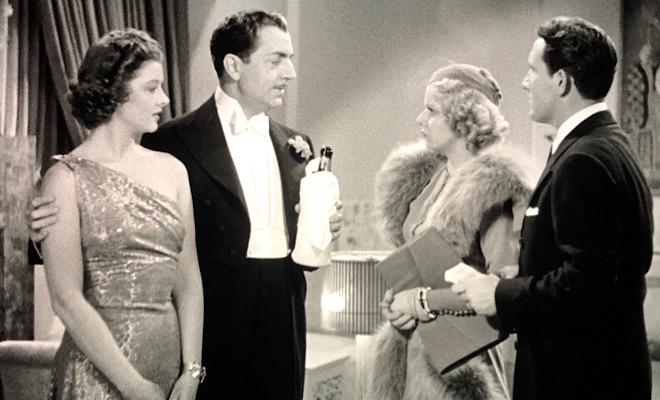When the New York Evening Star carelessly prints a false story about society dame Connie Allenbury (Myrna Loy) that results in a $5 million libel suit, editor Warren Haggerty (Spencer Tracy) decides to resolve the situation by hiring the sneakiest, smoothest operator he knows: ex-Evening Star reporter Bill Chandler (William Powell). The men don’t share a good history, but if anyone can come up with a scheme to fix this mess, it’s Chandler. Walking through the lobby of the Plaza Hotel, he is a dashing, elegantly mustached figure, his body language confident and relaxed despite receiving an overdue bill from the hotel management. When he meets Haggerty, he continually tries to brush him off, even saying “Warren” with an exaggeration that implies mocking reverence, all the while shooting off quick glances to make sure the newspaperman is taking his bait. Within no time, Haggerty agrees to Chandler’s expensive terms and they begin to conspire how to trap Connie in a real scandal.
Bill Chandler’s first scene in the screwball masterwork Libeled Lady (1936) is a perfect introduction to the man who portrayed him. Impeccably poised with a polished urbanity that belied his goofball sensibility, William Powell is one of classic Hollywood’s greatest and most tragically forgotten stars. Despite his peerless work as sleuth Nick Charles in the Thin Man films and his highly-publicized relationships with not one but two Golden Age icons — Carole Lombard and Jean Harlow — Powell isn’t often discussed alongside such luminaries as Humphrey Bogart, Clark Gable, Henry Fonda, and Cary Grant. However, like Grant, he had the heart of a clown, the suit of a gentleman, and the colossal talent of a legend.
A Powell character may look respectable, but they operate as if it were a disguise, a ruse to expose the ridiculousness of our institutions and the people who enforce them. His marionette-like physicality, vocal cooing, and cleverly executed facial twitches dissolve the image of the calm and collected man, unveiling the id we all wish we could indulge, one that insouciantly challenges authority and makes funny faces without vanity and bases decisions on desire rather than convention. To see Powell luxuriate in or surrender to silliness, again and again, is not only hilarious, it is cathartic. (Read more.)
From Silver Screen Classic:
There are legends of cinema who became stars in the heavens as well as on the silver screen way before their time. They are forever remembered young, vital and beautiful; lives tragically cut short through illness or accident such as Rudolph Valentino, Carole Lombard and of course Marilyn Monroe. But with all due respect to the latter, it was an earlier star who first embodied the concept of the ‘blonde bombshell’. Jean Harlow was a star who combined sexiness with sass, quick-fire delivery with a devastating sexual slow-burn and was electric on the silver screen. Her chemistry with her co-stars saw her as one of the premier stars of MGM and her death would shock the Hollywood film community. Yet her performances on screen remain timeless and a testimony to her long-lasting legendary status.
Libeled Lady was one of her final performances and such was her status that she received top billing over William Powell (her fiancé), Myrna Loy and Spencer Tracy. Despite signing on for the key role of Connie Allenbury, MGM ‘s Louis B. Mayer wanted Powell paired with Loy to capitalise on the pair’s prior successes. Settling for the role of Gladys, Harlow still gives a spirited performance in a film that is fun, fast-paced and enjoyable. By all reports, Harlow was not bitter and ended up enjoying the role and the film overall. Additionally, this great screwball comedy is a showcase of MGM’s top talent, something that few studios could boast and a characteristic that was commonplace on the MGM lot. On the surface, it’s easy to suggest that Libeled Lady was a vehicle for Loy and Powell, and as already mentioned Mayer wanted the two together. However, Harlow (and for that matter Spencer Tracy) were far more than supporting actors and the fact that Harlow received top billing suggests that as well. (Read more.)
Share



















No comments:
Post a Comment